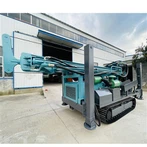Far beyond simple excavation, modern drilling rigs integrate hydraulics, precision mechanics, and material science to conquer diverse terrains – from unconsolidated sands to fractured granite. Impressive torque outputs up to 5,300 N·m provide the foundational force for this purpose, complemented by the ample power delivered by high-output 76kW engines.
The selection and operation of water well drilling equipment directly dictate project success. Key categories include versatile rotary rigs (employing direct rotation or down-the-hole hammers for deep, hard rock penetration), robust cable tool rigs (excelling in cobble-rich formations through percussive force), and agile hollow stem auger rigs (ideal for shallow, sandy aquifers). Synonymous terms like borehole drilling units, groundwater access systems, or well construction machinery reflect this diverse ecosystem. Each configuration addresses specific challenges: depth capacity, formation hardness, well diameter, and environmental constraints. Modern advancements prioritize efficiency – automated rod handlers reduce manual labor, advanced mud pumps optimize fluid circulation, and telematics enable real-time performance monitoring. Mobility is equally critical; truck-mounted, trailer-based, or tracked carriers ensure deployment to remote or rugged sites.
This machinery's impact spans essential human needs:
Rural Development: Installing potable water wells in underserved villages
Agricultural Security: Supporting irrigation for crop resilience
Emergency Response: Rapid deployment for disaster relief water supply
Industrial Operations: Providing process water for manufacturing/mining
Geothermal Energy: Enabling sustainable heating/cooling boreholes
Beyond technical specs, operational intelligence defines modern rigs. Features like adjustable mast angles allow drilling beneath obstacles, while modular designs enable quick reconfiguration between drilling methods. Safety systems – including falling object protection (FOPS) and ergonomic controls – safeguard operators during extended shifts. Crucially, precision fluid management (via swivels, pumps, and filtration) ensures borehole stability, prevents aquifer contamination, and extends well lifespan.
Ultimately, sustainable water security hinges on deploying the right water well drilling equipment. It bridges the gap between geological promise and human prosperity, transforming inert strata into flowing lifelines that empower societies and nurture ecosystems through relentless engineering ingenuity.









